COVID-19: THE TEMPEST
He calleth to me from Seir: Watchman, what of the night? Watchman, what of the night? The watchman said, The morning cometh, and also the night: if ye will enquire, enquire ye: return, come. Isaiah, 21: 11-12
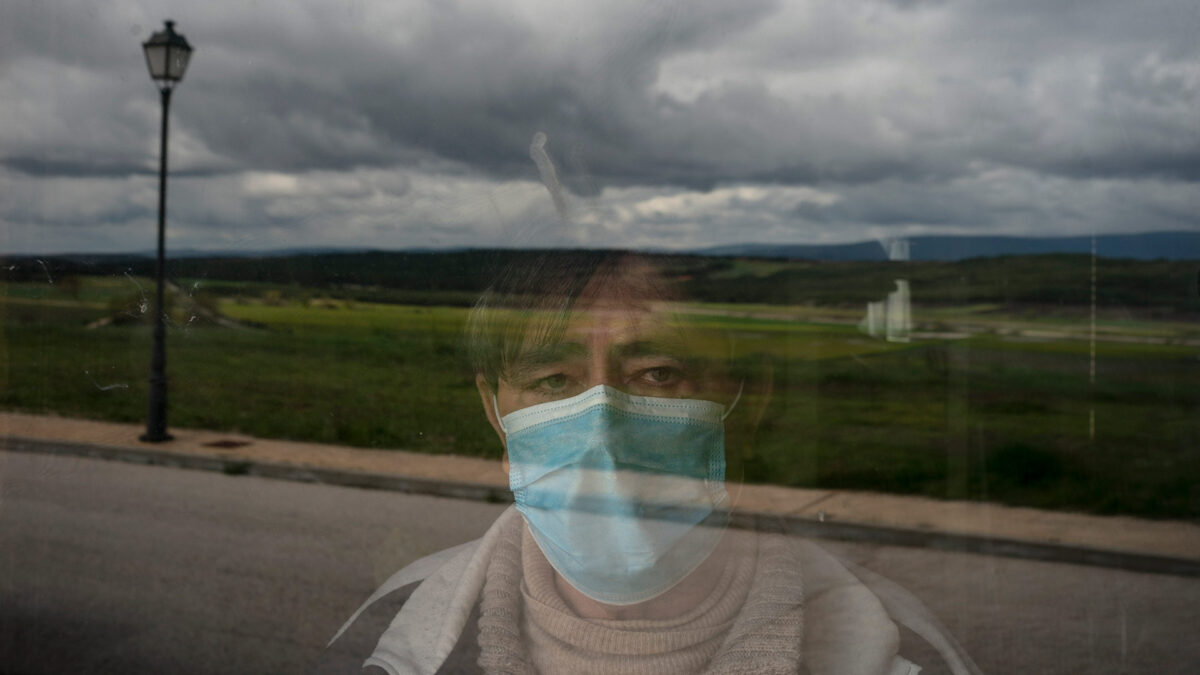
Felipe Dana | AP
The fever started on Monday 23rd March. I’d already experienced some minor discomfort and several coughing fits. My sister Paloma commented on the possibility that I was infected with the coronavirus[contexto id=”460724″]. She said it half-jokingly, but I took the comment badly. The previous Sunday I’d lacked the strength to get up before nine in the morning, much later than the hour I usually rise. The discomfort was increasing. On Monday morning I recorded my first abnormal temperature: 36.8° at nine-thirty. In the afternoon, at four o’clock, the fever reached 38.4°, but then it dropped and the situation returned to normal.
On that Monday 23rd March, there were 1,777 new cases of infected people in Madrid —6,584 throughout Spain— and 272 deaths. We’d been in a state of emergency since Saturday 14th March. Two days later, on the 16th, when it was still possible to go out for reasons of necessity, I’d taken the car to go to the University in Cantoblanco in order to pick up some books that I was going to need during lock-down. Everything was already deserted, except for an assistant in an office, behind the reception desk, and the security woman who made me sign a register at the entrance. I picked up the package that the librarians had left for me in the office, I got into the car, waved goodbye to the security woman from afar and, at the exit, instead of turning left towards Madrid, I turned right to go up to the mountains. I passed Tres Cantos, Colmenar Viejo, Soto del Real and reached the highest point of the Morcuera Pass. It was a cold day and it was drizzling a little under a grey sky covered with fast-moving dark clouds. In the middle of that vastness, the only noise I heard was an occasional and unpredictable gust of wind. I was completely alone.
On Tuesday 25th the fever spikes returned. One of them caught me while I was lying in bed in the afternoon, and it was so extreme that I felt like I was burning up. Suddenly the fever dropped and, for a moment, I felt liberated. I don’t remember when I became fully aware that I had Covid-19, but it must have been fairly early on. When I spoke to a friend on the phone, her voice faltered. We knew how serious the disease was, but we’d felt confident —at least I had— that, if it attacked us, we would suffer it in its most benign form. Her reaction made me aware that this wasn’t necessarily the case. I filled out an online questionnaire from the Regional Government several times, but the results were not conclusive. In a similar predicament, an American journalist had decided, after three attempts, to answer the question as to whether she’d been in contact with any patient in the affirmative. Only then did they take notice. We didn’t know what to do. The cough was persistent, but my increasing fatigue could only be attributed to the fever. One night I dreamed that I’d been taken to the IFEMA field hospital, which had started receiving its first patients by then. After 24 hours they let me go, without the slightest trace of tiredness, cough or fever. I felt euphoric, happy.
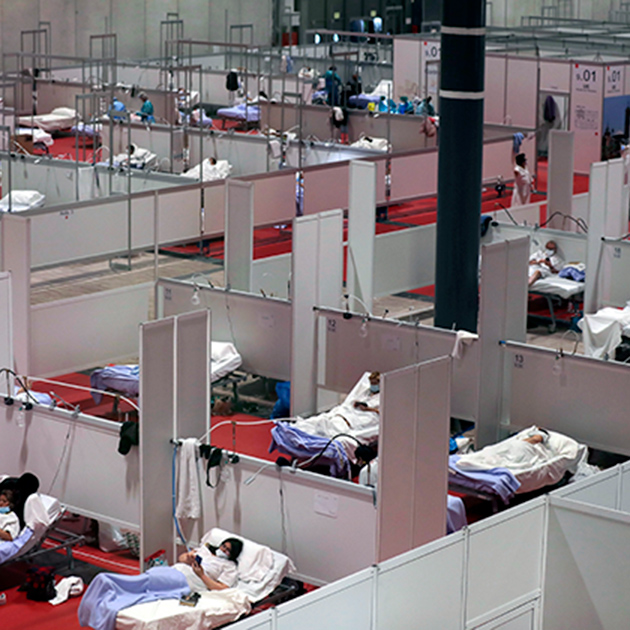
On the morning of Friday 27th, the fever rose above 38° and did not abate throughout the entire day. By then I’d lost my appetite and then, after a few hours in which everything, even the most insipid food, had tasted unbearably salty, I also lost my sense of taste. When I tried to freshen up with a little cologne, I realized that I’d also lost my sense of smell. It was like having a cold, only more drastic. The world seemed to recede, to move away from me.
The fever persisted on Saturday, having continued throughout the whole night. I called the Regional Government number and spoke to a very nice man, but he wasn’t able to offer me any kind of solution. At noon, with my fever still running at around 38.5°, I called a doctor friend. She advised me to go to the ER as soon as possible, at the Hospital of La Princesa, the National Health hospital that corresponds to my neighbourhood and where she had some friends. I spoke to my sister and, before leaving, I stored away all my keys, except the house keys; along with these I took only one credit card, some cash and a charger for the mobile. The Hospital of La Princesa is only two blocks away from my house, but I was unable to walk there. So I called a taxi, and the taxi driver, when he stopped at the ER entrance, gave me a glove when he saw that one of mine was torn.
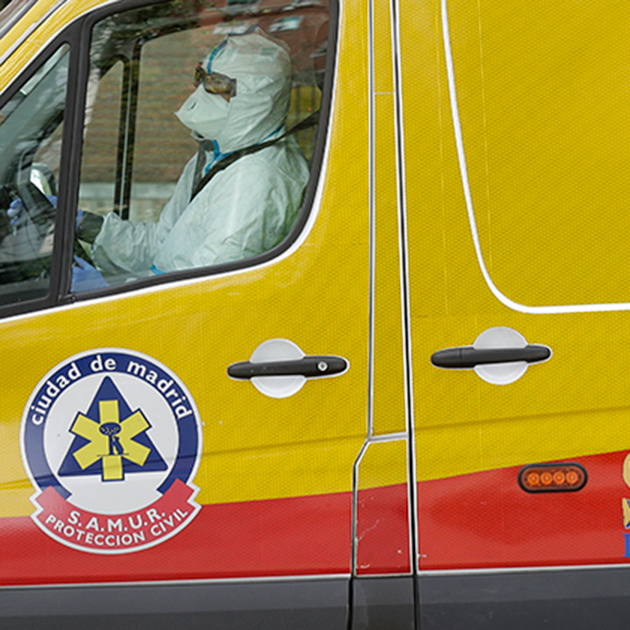
At the reception desk, a woman asked me not to get too close, not to put my hands on the counter and to give her the information out loud. Then she told me to wait on one side. Before long a young doctor called me. He led me to a tiny office, worn out by use, and, with a considerable distance between the two of us, told me to sit down while he made notes on the computer as I told him what was wrong with me. I went out again, waited a little longer than before, now in the ER waiting room, and when they called me again they informed me that they had to take some X-rays. It was right there on the same floor. We all wore facemasks, gloves, and the hospital staff had various kinds of protectors. The X-ray was ready very soon – one from the side and one from the front – and I went back to the waiting room. This time another doctor called me, also young. She attended me in a bend in the hall, both of us standing. She told me that I had pneumonia in my left lung, a serious condition, and that they were considering whether to send me home. The alternative was to spend several days in the ER, but they were unable to say when I would be admitted because there were no empty beds. With a wave of her hand she pointed in the direction of the room where I’d just been waiting. I pointed out my weakness, the fever and the certainty that, if I went home, I would return, in what state it was impossible to know, the next day or even a few hours later. The doctor looked at me for a moment without saying anything and told me to wait again. (At that moment I didn’t know anything about the patients who had died at home after returning from the hospital ER. Nor did I know that 40% of those admitted to hospital would die over the coming days.)
After a while – I don’t think it had been more than three hours since I’d arrived – an assistant called out my name and I went to what had once been one of the offices where doctors received patients. They’d turned it into a laboratory with hardly any room to move and two tiny spaces, the one at the back reserved for health personnel and another space, closer to the entrance, with several chairs. They sat me in a large chair covered with white paper and they gave me the first test, a PCR, by introducing sticks much longer than the usual ones, with something that looked like cotton wool on the tip, into my two nostrils and the throat. The procedure was short and quick. At the end of the corridor, a conversation was going on about a patient who’d had to repeat the test and whose result was pretty good (nothing serious it would appear). Then they asked me to turn my arm round with my palms facing upwards and, just when I expected them to draw blood, they stuck a long needle in my left wrist. I felt a slight discomfort: I experienced hardly any moments of physical pain, and never any intense pain, throughout my whole stay at the hospital. They told me it was an exudation, and since I’d never had one, I would’ve been interested to ask what it was. But I had no strength, either to ask or to hear the answer. Then they carried out an EKG and, I guess, although I don’t remember, an extraction for a blood test. They also placed a tract in the hollow of my right arm. That was when I realized that I was going to stay in hospital.
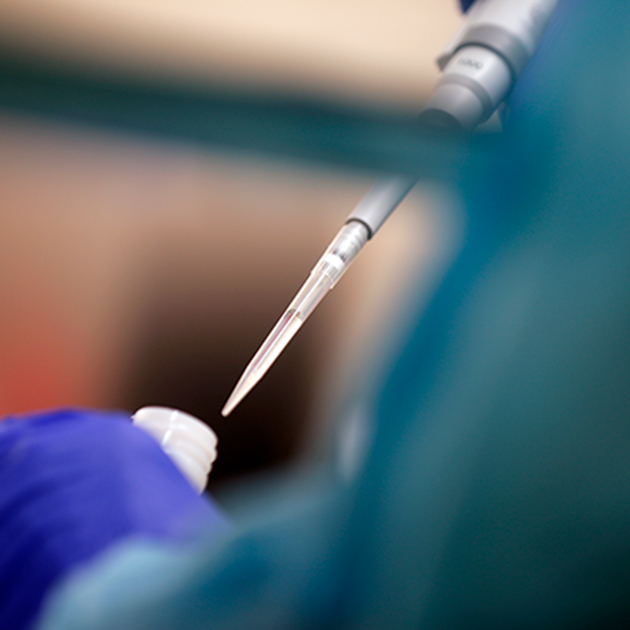
I went back to the waiting room and sat in an empty chair. The Emergency Room at the Hospital of La Princesa is an elongated room, with doors at the two ends. Between the two there is a long free space, like a corridor, divided into two areas, one wider area facing the street and the other shorter and narrower. The entire room is a place of transit. Large windows on one side face the street, calle Maldonado. Covered in opaque glass, they allow a grey light to filter in. The other window forms a parapet in front of the doors that lead to what used to be the consulting rooms of the ER doctors on duty. Now they had installed some armchairs there, which is where the patients were placed who were in need of the oxygen provided by a series of large, very heavy cylinders – tanks they called them – placed close to each patient.
More people had arrived throughout the afternoon and, although not all the seats were taken – we still tried to leave an empty seat between each one of us – the room looked crowded. Although they were motionless, the people sitting in the rows of chairs did not seem particularly calm or at rest. You would have said that they were all moved by some blind, inhuman force. Few people spoke, but in the background there was a continual dull rumour, one that felt vaguely threatening. A television hanging on the wall, turned down very low, added to the noise, although no one was watching the screen. Maybe in the past there would have been some religious symbol that might have made the room feel more human.
Among those in the ER there was a young woman, in her thirties, dressed in a blue denim jumpsuit splattered with white paint, her hands covered in green washing-up gloves, who paced up and down nervously, non-stop, with a deranged look on her face. She was invited several times to go home, but she refused again and again because she wanted to know what was happening to her father. They didn’t want to force the issue and even when they told her she was likely to catch the virus, she replied that she didn’t care. They left her alone – what else was there to lose, in such circumstances? – and she kept on walking. Close to the entrance facing the ER, an older woman had been placed in a wheelchair, bent over her knees, covering her face with her hands. When they came to ask her something, she moved her right hand in the air without raising her head, as if she were pushing something away that was unbearable. They came to collect her at some point that I don’t remember.
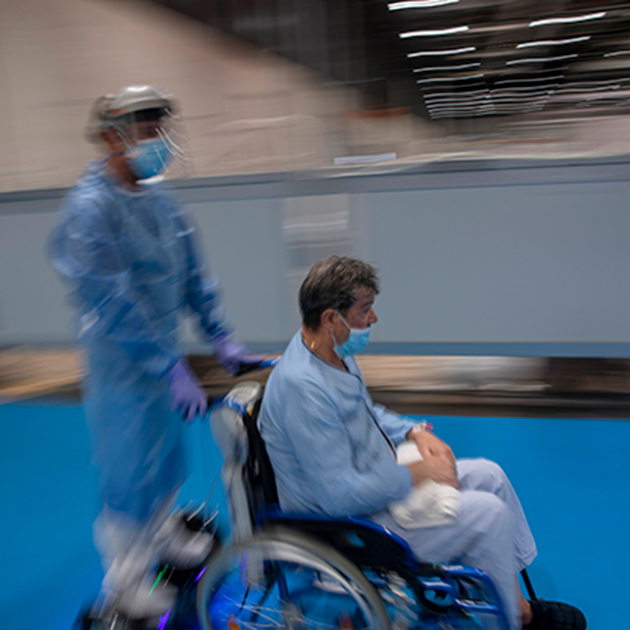
Then they brought in an old man, also in a wheelchair, with a livid face and sunken eyes; he didn’t know how to answer when they asked him his name. And when they asked with a little more insistence for him to tell them his last name, he asked them what a surname was. A little later another man arrived, also in a wheelchair. They soon asked him for authorization to start the experimental treatment that we were all going to be given and which required the patient’s approval, even if it was only oral. He replied that they should ask his wife, but he didn’t have a mobile or remember his phone number. An assistant managed to find it through the Health Centre and finally got him to talk to her, but apparently the woman replied that he was the one who should decide. The man, undoubtedly one of those older husbands who depends on his wife for the slightest thing, didn’t know what to do and so the situation remained like that until they took him away. Two days later, on Monday, a young woman arrived with her mother in a wheelchair, both diagnosed with Covid-19 and both overweight. This time the daughter, despite the tension reflected in her face, told one of the assistants that she was taking care of the situation. The mother, for her part, was unable to articulate a single word.
Some younger people arrived from time to time, such as a young man in his twenties who, after passing through one of the consultation rooms and coming out with his hand clutching his arm, just stood there for a while, staring at the scene in amazement, in a state of semi-denial you might say. Behind him, before he left, there’d been a young man sitting in the first row of chairs, close to where the lady covering her face with her hands had been. He’d repeated the same gesture as the old lady, his head covered with the hood of his black sweatshirt. He’d stayed like that for a long time until they came to ask him his name. It took them a long time to get it, since all he could do was emit a long, irregular moan. When he finally managed to say it, they left him alone. Now and then, wearing a phosphorescent orange vest over his sweatshirt, he wandered up and down the hall like a caged beast. He continued his walks all night; he demanded respect, but no one seemed to be afraid of him. He tried to escape several times, but the security guards stopped him and managed to calm him down.
On Sunday morning, after a night dozing fitfully in a small armchair, I was called to another office, next to the one where I’d been tested the previous afternoon. It was packed, with about ten or twelve people sitting around, some still asleep. I sat in the only empty seat and they extracted some blood from me, an unprecedented amount of blood (in spite of my generally good health, I also have a long medical record). Directly opposite, barely two metres away, there was a boy in his early twenties, with curly hair in short ringlets, as if they’d been planted on his head, wearing a black T-shirt with the word NOISE printed on it diagonally in large letters. I’d seen him the previous afternoon, with the same wild-eyed expression. Now he began to stare with consternation at the multiple coloured tubes filling with my blood, as if he didn’t understand what they were doing to me. It was then, as far as I remember, that they told me that the previous analysis had tested positive and that I was suffering from Covid-19. I returned to the large room and sat on another small chair, more or less in the centre of the room, which now, in the morning, seemed a little brighter and less crowded.
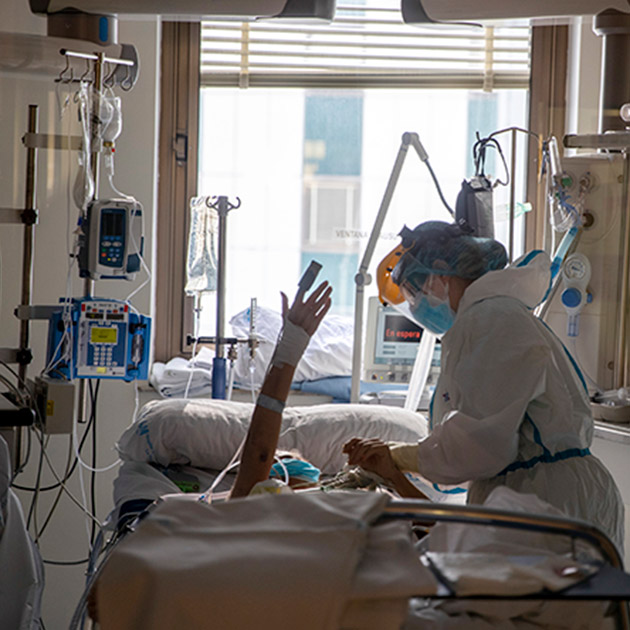
The night before dinner had been distributed to us on trays with a piece a paper with our name on it. They now served us breakfast using the same system. They brought the trolley and the assistant called out the name until the person came to collect it, something that didn’t always happen automatically: some had fallen asleep or had taken refuge in one of the small rooms; and some had also probably left. Dinner was always the same: consommé —and once “sopa de lluvia”— purée, compote or some cream caramel. It was very good. In one corner they eventually set up a small table with water, juices and fruit. They gave me serum through the tract in my arm and, when the fever reached 39° again, as happened that same morning, they gave me paracetamol.
The same Sunday I started the treatment I’d consented to shortly after the first tests were completed. It consisted of one Kaletra tablet (consisting of lopinavir and ritonavir, two antiretrovirals used to control the effects of AIDS), one tablet of Dolquine (hydroxychloroquine), and one antibiotic, Zitromax, twice daily. Consulted via WhatsApp, friends and family with knowledge of the matter assured me that it was the best possible treatment in those circumstances and that it was known to produce good results. In the midst of this storm —only God knows at what cost in terms of tension, spirit and will— a human form of organization had emerged.
I had developed such a degree of respect for my high fever spikes that when a nurse agreed to give me paracetamol through the tract, after telling me I had a fever of almost 38°, I thanked her so effusively that she burst into tears behind her transparent plastic screen, with her mask on. I had seen the stoicism of the security guards and cleaning and maintenance staff as they moved chairs and oxygen tanks in the midst of that sick and contaminated multitude. I had seen nurses and assistants who refused to lose their ability to laugh, to joke with patients, to provoke them and sing – yes, sing – particularly P., who displayed an overwhelming vitality, and another very young woman who had placed a paper crown from the Burger King on the corner over all her protective gear. Until that moment, however, until that nurse began to cry, I had not realized what it really meant to be there and take care of us all in such circumstances. After the successive announcements that I had had to make to my sister, this was the most difficult moment during my time in hospital. Every evening, at eight o’clock, the ER staff gathered in the middle of the room and cheered and applauded us with their arms raised. They received a friendly, but lukewarm response, one devoid of energy. Later on, when I was back at home, I was unable to go out to applaud in the evening.
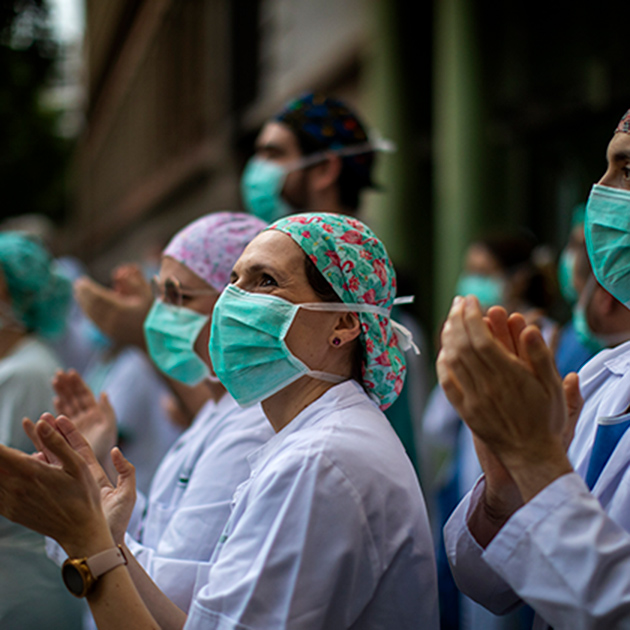
On Saturday morning I received a visitor. Given that we had entered the hospital with almost nothing, without foreseeing what was going to happen, the relatives or friends of those admitted to the ER left packages at the entrance, and these were distributed later. At around ten, my sister approached the door and left a package, while I waited inside. So I was able to catch a glimpse of her on the other side of the street when I went out to pick it up, under the watchful eye of the security guard.
As the hours passed and the ER emptied of patients, who were admitted to the hospital rooms or returned to their homes, those of us who were waiting for admission gradually moved to the back. There they had placed some more comfortable armchairs, the kind you find in day hospitals. By then, a small group of veterans had formed. Among us there was a boy of Ecuadorian origin, thin, who sat reclining in his chair, as if burdened by the weight of the whole world. There was a couple of a certain age, who found time to argue, separate and reunite in order to enjoy the relief of the oxygen tanks. There were two young men who had received spare clothes and hadn’t lost their desire to joke around. Another man, even younger, with glasses and the appearance of a teacher, had ended up sitting next to me. Without saying a word, his gaze fixed, he focused on something that only he was able to see. There was an older woman, who was very thin and perfectly dressed and groomed – in the many hours she spent there not a lock of her white hair was displaced; she moved like a bird, her eyes lost. She was deaf, and when a meal or medicine had to be delivered, there was always a small group of volunteers chanting her name.
As people were called to go upstairs, the tension mounted as the hours, then the days, passed. On Monday afternoon, some people began to complain because they didn’t understand the selection criteria. A woman was taken upstairs to a room but was taken back downstairs again because the cleaning hadn’t been done. In the end they told her there had been a mistake. We all felt too weak to protest. I don’t know how the news circulated or where it came from, but at some point we learnt that expeditions to the IFEMA field hospital were going to start. When it finally happened that night, they read a list of names and gave everyone a plastic packet with medicines for several days. The boy of Ecuadorian origin was among them, and when he heard his name he suddenly drew strength and he carefully arranged his hair with a comb he had in the back pocket of his trousers. I was still feverish and so weak that the trip to IFEMA seemed infinitely painful, quite beyond me. I fell asleep, until about half past one, on Tuesday, I heard my name repeated by my fellow patients and woke up. A porter helped me up, sat me in a wheelchair, and after the farewells, led me down a long hallway. He took me up in the elevator and left me in a room where, on the bed closest to the door, another patient was resting.
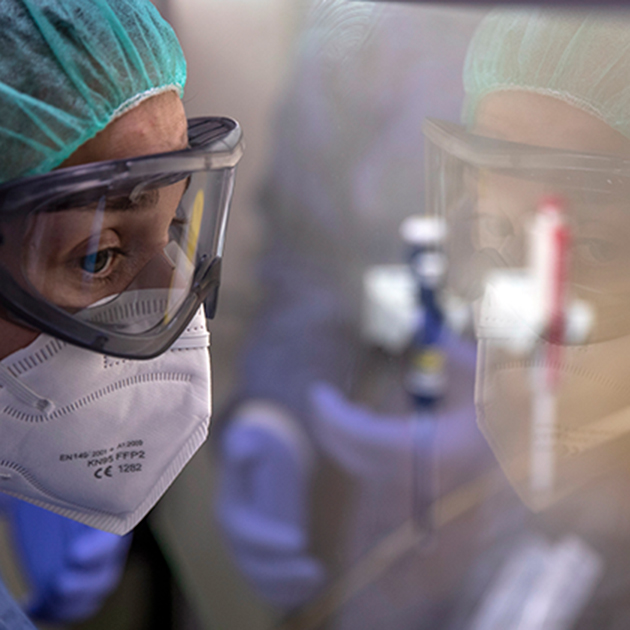
I didn’t have the strength to take a shower, but I washed, went to bed, and I guess I soon fall asleep. I woke up several times, startled at one point, and once when I realized I was in a quiet room, with clean clothes, I almost started crying. I prayed in my dreams, something that had never happened to me before, and I kept trying to remember, as had happened to me in the ER over the previous days, the text of the psalm about the watchman of Israel, but without much success.
The next day, after a shower and breakfast – the same one we were given downstairs, on the same tray and with the same sticker with the corresponding name -, I felt a little less weak. Then the cough returned, a cough I hadn’t paid much attention to over the previous days. It wasn’t a cough really. It was the unsuccessful result of an attempt to cough, an effort repeated over and over again, without respite. I realized that by simply uttering ten words in a row I was out of breath. Trying to go further threw me into another coughing fit. This had happened to me before I reached the ER, but now it was coming back with more intensity.
So I resumed my life in hospital, based on a schedule, full of empty moments interrupted by nurses, assistants and cleaning staff. Every four hours they took our temperature and checked our heart rate and oxygenation. Under 93 on the oxygenation scale meant giving the patient oxygen. I never had much trouble in this respect, and I didn’t have any major breathing difficulties either. Instead, they were concerned about my swollen feet and ankles, something I was quick to attribute to the long stay in the ER (I was also completely unaware of the complications that Covid-19 causes regarding blood circulation). One night the cough became so persistent that I decided to call the nurse. The nurse advised me to try sleeping on my stomach, and, as I heard later, many of the hospitalized patients spent the nights sleeping this way. A few days later, the same nurse told me that she had returned that night after a while and that she had found me sleeping peacefully with my face buried in the pillow.
The hospital routine, which was quite strict, was deceptive. No one entered the room without yelling from the door: “Masks!”. And the exclamation took on, as the days went by, a more and more musical tone, like the start of a zarzuela scene
The hospital routine, which was quite strict, was deceptive. No one entered the room without yelling from the door: “Masks!”. And the exclamation took on, as the days went by, a more and more musical tone, like the start of a zarzuela scene. There were no towels. Suddenly plugs for the tracks were missing, or someone missed a “wing nut” for the tests. They didn’t bring bottled water either and, on two occasions, the trolleys (I guessed they were the food carts) disappeared without anyone knowing where they could be. Perhaps they had been taken to another section. It’s also true that there was always a solution. The medical supplies appeared in the end and, instead of towels, there were sheets; and we were obviously being invited to refill our water bottles from the tap. My roommate needed oxygen to breathe, even when he was going to the bathroom. The nurse brought an extension cord that didn’t work. They brought her another, which didn’t work either. And when she was trying a third one that still didn’t work and everyone in the room expected that she would collapse or resort to swearing, she raised her arms with the extension lead in her hands and exclaimed: “I’m McGyver!”
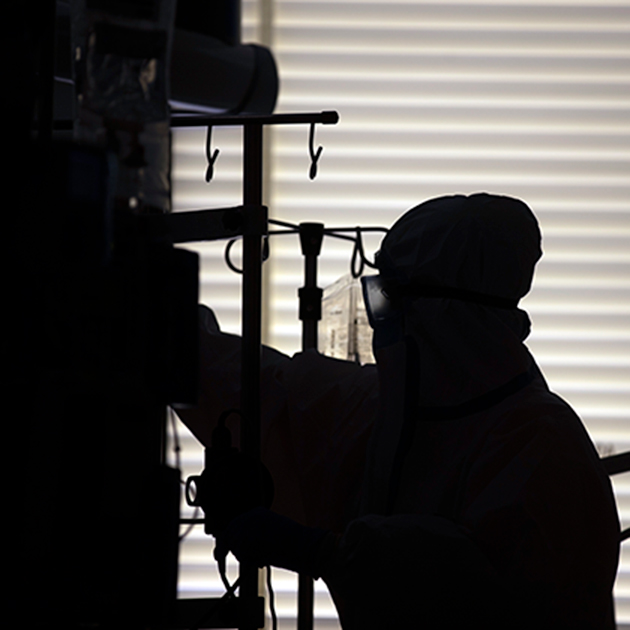
This same nurse, M., had had her father in the ER for a few hours. The next day she told us that he had been sent home and, by look on her face, we realized that everything was going well. A cleaner told me that her husband and son were on the “front line”, one as a bus driver and the other as a local policeman. She added that her husband had lacked any means of protection, but that as long as she was here at the hospital, they would have appropriate protection for sure. Everyone wore a different kind of protection. Some wore plastic visors that protect the entire face, others only a mask. An assistant wore a transparent pink raincoat several times. I hope that it worked; it was certainly cheerful. At night it was more frequent to see the nurses in their full protection white overalls (they also wore them sometimes during the daytime, and it was quite a spectacle to see from the window how they cleaned the rooms on other floors, all the staff dressed in their PPE’s.) F., a nurse born in a village in Jaén who treated patients with infinite delicacy, commented, when I pointed out the ideograms on his chest, that the Chinese, the exporters of the virus, were now doing business with the protective material.
Nobody talked about that, of course, and in addition to the efforts made, the staff were determined to hide the real dimension of what was happening around us
Another nurse, V., with her voice almost gone and a face tense with exhaustion, repeatedly showed an extraordinary clinical eye. Just by looking at me she detected that I had a problem with the tract, which after several days and no longer being useful, was hurting me and prevented me from bending my arm. V., who came from the psychiatric ward, also succeeded in drawing blood on two occasions when other assistants were unable to find my vein in either arm. They always showered apologies on us. I would have liked to ask more questions about the situation, but I was too weak to speak and had to limit myself to some generalities. Early in the morning, when I asked about the night, they answered me with some exclamation that suggested a difficult situation. At that time I didn’t know anything, although I began to suspect it had something to do with the unexpected worsening of the patients. Alongside the avalanche of patients, the lack of resources and the demands of the job, not to mention their organization and medical decisions regarding the patients and their treatment, there was an additional factor: an obsession with the unpredictable derivations of a disease that they knew little about and only knew how to treat in an approximate manner, not even imagining what might appear at any time. Nobody talked about that, of course, and in addition to the efforts made, the staff were determined to hide the real dimension of what was happening around us. I have never seen such a degree of courtesy. Only an army – in this case an army without a leadership, without resources, without uniforms, faced with an unknown enemy – could display such a degree of dignity and grace.
One morning I received the news of the death of a good friend. He had been in the ICU of another hospital for several days, where his wife, who was recovering, had also been admitted. Soon afterwards I learned that another friend was in a hospital, very close to the Hospital of La Princesa. Thus began an endless litany of sick friends and acquaintances, some treated at home, others hospitalized, some who died. Several of them died in nursing homes and one in an appalling condition, as in the early days of AIDS. On Friday, around five in the afternoon, my friends on the radio show where I work dedicated a song to me, The Tide Is High by Blondie.
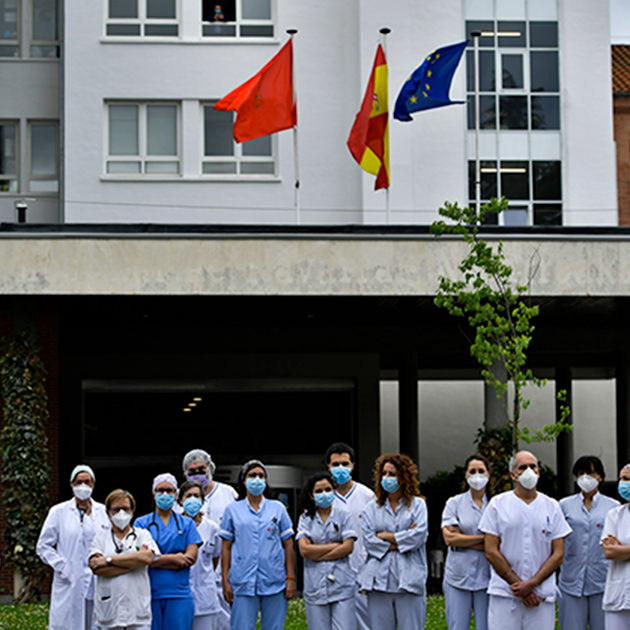
The days were cloudy, with gusts of rain and wind. My second roommate liked to open the window so we could get some fresh air. I liked it too. One night when we could hear the water hitting the patio floor, I dreamed that a toxic rain was falling and that all of us, staff and patients, were locked up, abandoned in the hospital, in that huge brick ten-storey building with interior patios, a place I have come to know so well over the years. Our window overlooked a patio that opened onto “calle” Maldonado, the same street that ran along the ER. After leaving the hospital, at night, I had several hallucinations in which the room and the ER were superimposed on my apartment, in a very real and consistent way.
I responded to the treatment quickly. I think they removed the antibiotic first, then the chloroquine. On Sunday 5th April I had the last dose of Kaletra. Little by little the “crackling” of my bronchial tubes had decreased, something they monitored every time they checked me. I was going to be discharged on Monday, but a rise in potassium, a minor problem, postponed it. I left on Tuesday 7th April at 1.30 p.m., when the situation in the ER was less tense and there were, according to what I was told, even several Covid beds free. I said goodbye to my roommate and to V., to whom I tried to express, with bows and folded hands (as if we were Japanese), the honour and privilege I felt at having been treated by her and her colleagues. Earlier the doctor had come to say goodbye, something we did in the doorway of the room so that she didn’t have to enter. She told me they couldn’t do another Covid-19 test as they didn’t even have them for the staff either. I told her not to worry.
Carrying two bags – one of them a yellow rubbish bag – I took the elevator with a man who kept staring at me until we reached the bottom. I had tried to freshen myself up, but I don’t know what I looked like. I passed the beautiful hospital chapel on the left, the heart of the entire compound, now closed. I was feeling very weak, so I took a taxi at the hospital entrance and crossed a few empty streets, flooded with sun. I walked into my freshly cleaned apartment, which was calm and silent. I was returning to confinement.
Translation from Spanish: Paloma Marco and Mark Oakley.
